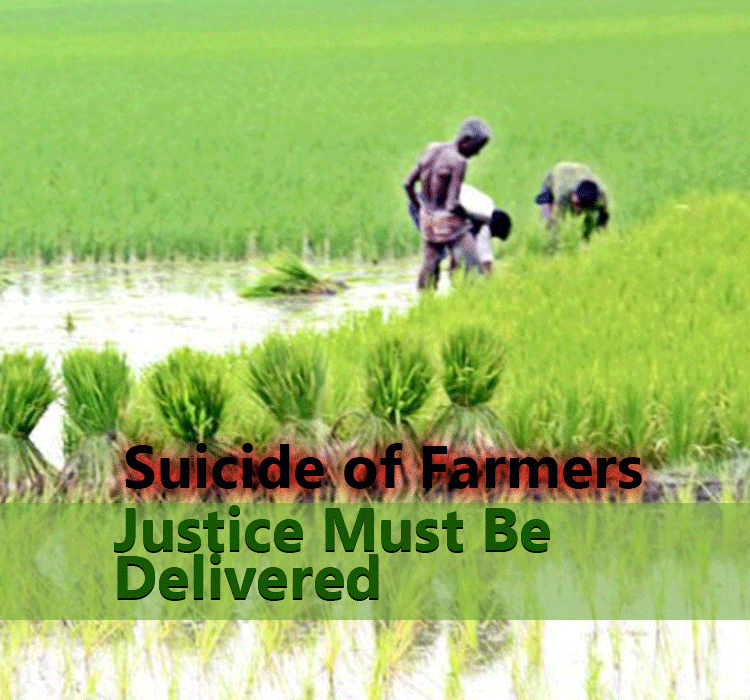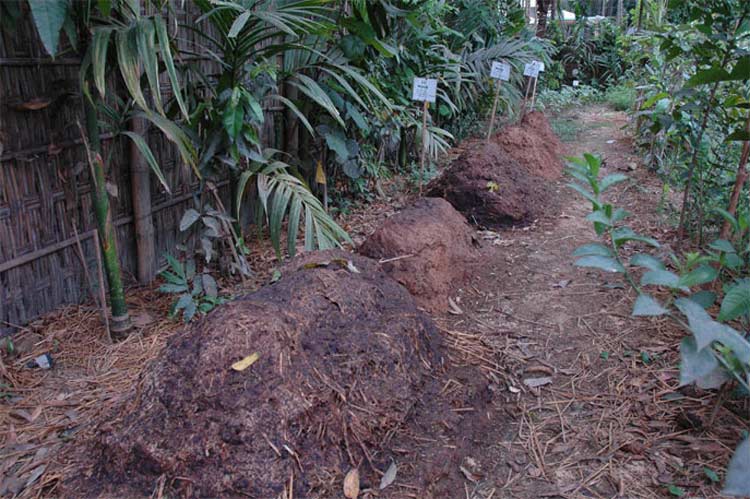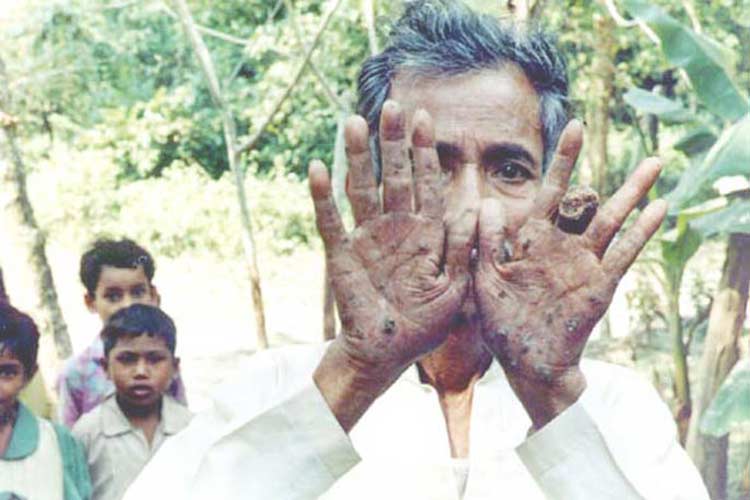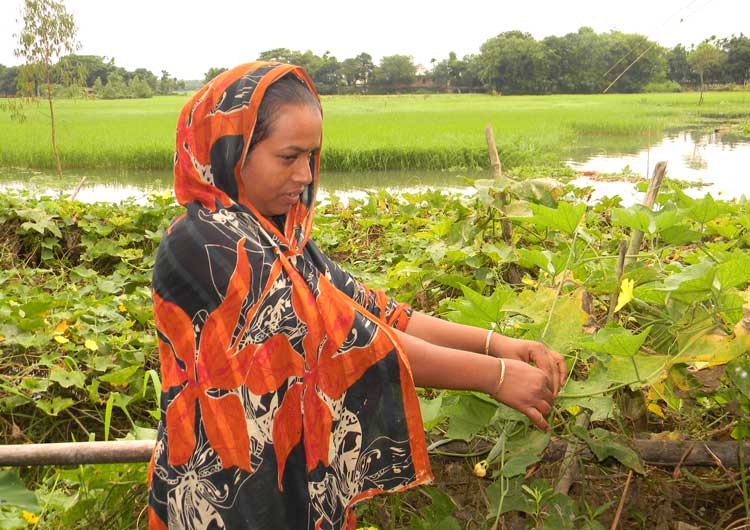
Farming in Bangladesh. — Wikimedia Commons
TWO young farmers, Abhinath Marandi, 30, and Rabi Marandi, 27, at Godagari, Rajshahi committed suicide by taking poison (pesticide) near a Barind Multipurpose Development Authority deep tube well project at Iswaripur on March 23 as the tube well operator, Sakhawat, refused to irrigate their paddy fields. They were cousins and belonged to the Santal community. This incident has a clear connection with the supply of irrigation water that t

THIS year, aman rice suffered severe loss due to a series of floods and untimely rain. At the household level, the farmers will have shortage of rice for consumption and selling, while at the national level people will inevitably face crisis of food since aman paddy cultivation provides 35 per cent of the total rice production of Bangladesh. Due to the recurring floods, farmers missed the planting season in the month of August. Most farmers could not prepare the seedbeds. In some areas, flood

Bangladesh has achieved a significant success in food grain production in the recent past which has made the country self sufficient in food grain. Bangladesh was food deficit prior to 1971, the year of indepence and continued to be so for long afterwards. However, the country is now self-sufficient in rice. Rice production increased from 11.7 million metric tons in 1974 to 33.54 million metric tons in 2010 (BBS, 2011). One of the keys to this success has been the use of chemical fertilizer,

Arsenic is a poison. It is a significant health risk to millions of people worldwide when it is there in food and drink. It is highly poisonous at higher doses but chronic exposure to lower levels increases the risk of cancer of skin, bladder, lungs, kidney ,liver, colon , prostrate; cardiac disease, pulmonary disease, cardiovascular disease ,diabetes; diseases of arteries and capillaries ; increased sensitivity to Hepatitis B infection , infertility, and other ailments .Observable symptoms t

Policy making in a country like Bangladesh is not an easy task, a meaningful policy position is impossible without serious efforts from the policy makers to involve stakeholders; secondly, it is necessery to involve various groups and organisation active through empirical reserach or programmes that government wishes to address. Without a meaningful base of empirical reseach and participation of relevant stakeholders, a policy document could hardly be of any value. If policy makers igno
স্থানীয় জাতের বেগুন রক্ষা করুন
প্রতিবাদ ও দুনিয়ার সেরা বিজ্ঞানীদের সাবধান বাণী উপেক্ষা করে ক্ষতিকর বিটিবেগুন বা বিকৃত বেগুনের জাত বাংলাদেশে প্রবর্তন ও বাজারজাতের অপপ্রয়াস চলছে। বেগুন গাছে মাটীর ব্যাক্টেরিয়ার জিন ঢুকিয়ে পুরা বেগুন গাছকেই বিষাক্ত করা হয়। সেই গাছ ফল আর ডগা ছিদ্রকারী পোকা খেলে মরে যায়, কিন্তু বিষাক্ত বেগুন মানুষ খেলে ক্ষতি হয় না, এই হচ্ছে বৈজ্ঞানিক দাবি।
কী দরকার? কারন সারা দুনিয়ায় বেগুনের বিলিয়ন ডলার ব্যবসা। মার্কিন বহুজাতিক কম্পানি মনসান্টো ও ভারতীয় কোম্পানি মাহিকো তা তাদের একচেটিয়া নিয়ন্ত্রণে নিতে চায়। এর কারিগরি দিকের মালিকানাও তাদের। বাংলাদেশের বেগুনের ওপর এই কারিগরি খাটীয়ে তার ওপর বুদ্ধিবৃত্তিক মালিকানা দাবি করছে তারা। অন্য দিনে বাংলাদেশের স্থানীয় বেগুন ধ্বংস করে শুধু কম্পানির বেগুন আমাদের খাওয়াতে চায়। জীবন ও স্বাস্থ্যের ওপর যার সম্ভাব্য ঝুঁকি মারাত্মক হতে পারে।
বাংলাদেশের প্রাণবৈচিত্রের ওপর বহুজাতিক কম্পানির দখলদারির এই কৌশল প্রতিহত করতে হলে নিজেদের বেগুনের জাত চেনা ও রক্ষা করা জরুরী। এটা আমাদের সকলের সচেতনতা ছাড়া সম্ভব নয়। অতএব নিজেদের বেগুনের জাত সম্পর্কে জানুন, এবং নয়াকৃষি আন্দোলনের কৃষকদের সহায়তা করুন। এর বিরুদ্ধে লড়তে হলে নিজেদের জাত রক্ষা করার বিকল্প নাই।
প্রাণবৈচিত্রের উৎসভূমি (origin of diversity) হিসাবে বাংলাদেশ বেগুনের বৈচিত্র্যের দিক থেকে দুনিয়ার যে কোন দেশের চেয়ে সেরা। বেগুনের আন্তর্জাতিক বাজার বিশাল, কারণ সব্জির মধ্যে বেগুন সুস্বাদু এবং এর মধ্যে তেল (fat) নাই বললেই চলে। তার মানে বাংলাদেশের অর্থনৈতিক সমৃদ্ধি নিশ্চিত করবার জন্যও আমাদের দেশি জাতের বেগুন রক্ষা করতে হবে।
নয়াকৃষি আন্দোলন যে সব বেগুন নিয়মিত চাষ করে তার কিছু ছবি এখানে দেওয়া হোল।
Protest Against Btbrinjal Continues
SUPPORT PEOPLE"S PROTEST AGAINST BtBRINJAL
Pictures of rallies and protests against Btbrinjal. Farmers, scientists, environmentalists, ecologists, lawyers, teachers and consumers have been protesting agaginst Btbrinjal since
Bangladesh Agriculture Research Institute (BARI) was trying to get approval from the government for cultivation and commercial release based on inadequate, incomplete and unethical research practice. GMO promoters Undermined strict adherece of 'preacuationeruy principle' during field trial necessery to protect environment and all life forms including human beings from potential environmental and health effects of the genetically modified crops.
UBINIG Centre (BIDDAGHORS)
Nayakrishi centers in the districts of Tangail, Pabna, Cox’s Bazar, Kushtia.
Introducing Dai Mas (Traditional Birth Attendants)
Introducing key leaders of the rural health movement in Bangladesh.
Dai Ma (Traditional Birth Attendants) plays a major role in rural health systems particularly in maternal & child health and in the use and conservation of medicinal plants. UBINIG is working with them for a long time to develop a link with their practice with agro-ecological approach to health, medicine and nutrition led by Nayakrishi farming communities who practice biodiversity based ecological agriculture. Dai Mas are now organised into a network engaged in innovative knowledge practices and institutional experiments. This will enable them to contribute more effectively to national health system. They have strong grass root connections and effective social network. They are self-motivated and monitor the health of mother and child on their own as a responsible member of the community. Sense of responsibility come from their being woman and the natural instinct to help other women in child birth and child rearing. A command on indigenous knowledge and profound understanding of reproductive and child health make them unique in their role in the community. UBINIG is working with theme to find innovative and effective ways to link them with national health system.
Daighors (দাইঘর)
Translating Dai Mas as 'Traditioal Birth Attendants' misses the profound cultural, social and knowledge based practices of women in rural areas of Bangladesh. First, Dai Ma’s symbolises a social relationship. Her responsibility does not star during childbirth, rather when a woman comes as a bride in her village or locality. She is the main source of reproductive knowledge for women in reproductive age. In most cases, the Dai Ma is connected to the families of her in laws by helping in the birth of her husband. Dais are always married and have children, this is her acceptability as 'Dai' (birth attendant) in the village. She is the living medical and health record of the women in the village and without her a community health care system is almost impossible on which the national health care system has to rely on.
Glimpses from Nayakrishi Villages
Biodiversity-based ecological agriculture is note merely 'ORGANIC', but a unique practice without pesticide, chemicals and ground water extraction to achieve the highest systemic yield from per acre of farm land. Households are small ecological production units constituting a complex design encompassing the whole village. You can purchase the farmer's produce from Shashyshaprabartana.
Samples of UBINIG Posters
Posters express concerns and ideas. They are interesting materilas to read and listen as well participate in the issues one is committed. UBINIG regularly prints and shares posters as a way to build up networks and communications. Web through some examples posted here.
UBINIG PUBLICATIONS (ENGLISH)
UBINIG publications. To order please contact UBINIG (Policy Research for Development Alternative) 88 0178 001 1194 or`
Narigrantha Prabartana
6/8 Sir Syed Road, Mohammedpur, Dhaka -1207.
Phone: 880-2-9140812 . email: narigrantha@gmail.com
আমাদের বাংলা প্রকাশনা
উবিনীগ (উন্নয়ন বিকল্পের নীতি নির্ধারণী গবেষণা) থেকে প্রকাশিত গুরুত্বপূর্ণ বাংলা বইয়ের তালিকা। আরও জানার জন্য উবিনীগ অফিসে যোগাযোগ করুন (মোবাইল: ০১৭৮০০১১১৯৪)। বই সরবরাহ ও যোগাযোগের জন্য:
নারীগ্রন্থ প্রবর্তনা ৬/৮ স্যার সৈয়দ রোড, মোহাম্মদপুর, ঢাকা-১২০৭, বাংলাদেশ।
ফোন: ৮৮০-২-৯১৪০৮১২, মোবাইল: ০১৯৫ ৪৪৭৬০৬৪ । ই-মেইল: narigrantha@gmail.com











